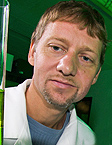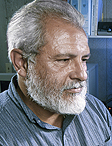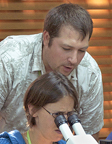This page has been archived and is being provided for reference purposes only. The page is no longer being updated, and therefore, links on the page may be invalid.
Agricultural Research Service Announces "Scientist of the Year" AwardsBy Dennis O'BrienJune 11, 2013 WASHINGTON—Ronald J. Nachman has been named Distinguished Senior Research Scientist of 2012 by the U.S. Department of Agriculture's (USDA) Agricultural Research Service (ARS) for discoveries regarding insect neuropeptides that have opened the door to novel, environmentally sound strategies for controlling some of the most threatening agricultural pests. ARS is the principal intramural scientific research agency of USDA. Nachman is a chemist and senior scientist at the Southern Plains Agricultural Research Center in College Station, Texas. He and other ARS researchers are being honored today at a ceremony in Beltsville, Md. "Through his creativity, ingenuity and patient determination, Dr. Nachman has demonstrated how insects use neuropeptides to survive and how we can use those same neuropeptides as a basis for controlling them. With many insects developing resistance to available control treatments, the work is all the more crucial," said ARS Administrator Edward B. Knipling. Nachman and his collaborators were the first to show that insects use neuropeptides to regulate water balance, digestion, metabolism and early development. Neuropeptides are unusable in their natural forms because they are degraded by enzymes in the insect blood, tissues and gut. Nachman and his partners were the first to develop stable neuropeptide "mimics" unaffected by the enzymes, which is critical for disrupting the processes that neuropeptides regulate. They were also the first to develop modified neuropeptides that could penetrate the insect's protective exterior and gut wall, a necessity for potential treatments to take effect. The work has proved to be instrumental in helping to enhance the effectiveness of insecticides, ward off mosquitoes, kill pea aphids, block production of reproductive pheromones in tobacco budworms and disrupt diapause in cotton bollworms, a tactic that forces them to commit a kind of "ecological suicide." Recognized as a world authority on insect neuropeptides, Nachman has co-edited four books on the subject, has mentored numerous students and visiting scientists and is a fellow of the American Association for the Advancement of Science. |
|||
|
Frederic T. Barrows, ARS Small Grains and Potato Germplasm Research Unit, Aberdeen, Idaho, for propelling ARS to global prominence in sustainable aquaculture feeds research through his leadership, technical expertise and vision. (more) |
|||
|
|
|||
|
|
|||
|
|
|||
|
|
|||
|
|
|||
|
|
|||
|
ARS is also recognizing outstanding "early career scientists" who have been with the agency for seven years or less. The top prize, the Herbert L. Rothbart Outstanding Early Career Research Scientist Award, will be presented to Steven B. Cannon of the agency's Corn Insects and Crop Genetics Research Unit, Ames, Iowa. He was recognized for distinguished research and leadership in genomics of legume crops. |
|||
|
Anthony R. Buda, ARS Pasture Systems and Watershed Management Research Unit, University Park, Pa., for innovative research on stream hydrology and water movement in soils in ways that support development of novel practices to protect water quality. (more) |
|||
|
|
|||
|
|
|||
|
|
|||
|
|
|||
|
|
|||
 Kevin Welch, ARS Poisonous Plant Research Lab, Logan, Utah, for novel scientific investigations into the toxicology of mixtures of multiple plant toxins, and teamwork with collaborators and members of the research unit. (more) Kevin Welch, ARS Poisonous Plant Research Lab, Logan, Utah, for novel scientific investigations into the toxicology of mixtures of multiple plant toxins, and teamwork with collaborators and members of the research unit. (more) |
|||
|
Knipling also announced the 2012 ARS Technology Transfer Awards for outstanding work in transferring technology to the marketplace. Individuals and groups are being recognized in two categories: for achievements with immediate impacts on the marketplace, and for achievements that represent five to 15 years of sustained effort. In each category, top awards were given for outstanding achievement and scientists also were cited for superior efforts. |
|||
|
For "outstanding effort" in technology transfer, with immediate impact: The VSH Breeding Group, Honey Bee Breeding, Genetics and Physiology Research Laboratory, Baton Rouge, La., for identifying a genetic honey bee strain capable of resisting Varroa mites and transferring the trait to bees used by commercial bee breeders for continued pollination of much of the nation's food supply. The team includes: Robert G. Danka, John R. Harbo (retired) and Jeff Harris; and partners Tom Glenn and Suki Glenn, both of Glenn Apiaries, Fallbrook, Calif. |
|||
|
The Virtual Grower Software Development Group, Application Technology Research Unit, Toledo, Ohio, for developing support software to assist greenhouse operators in estimating heating and energy needs specific to their locations, greenhouse designs, crops and management preferences. The team includes: Bryon A. Hand, Jonathan M. Frantz, Deanna Bobak, and Lee Buckingham; and partner Erik Runkle, Michigan State University, East Lansing, Mich. |
|||
|
For "superior effort" in technology transfer, with immediate impact: Jorge A. Delgado, ARS Soil Plant Nutrient Research Unit, Fort Collins, Colo., for leadership in developing tools to improve nitrogen management and reduce nitrogen losses to the environment, contributing to the conservation of natural resources. Fumiomi Takeda, ARS Appalachian Fruit Research Station, Kearneysville, W. Va., and partner Richard Barnes, Trellis Growing Systems, Inc., Fort Wayne, Ind., for developing rotating cross-arm trellis and cane training systems for commercial blackberry production. Daniel H. Pote and Stephen M. Haller, ARS Dale Bumpers Small Farms Research Center, Booneville, Ark., for developing the poultry litter subsurfer, a novel tractor-drawn machine that applies dry poultry litter below the surface of pasture/no-till fields. The Western Rangelands Invasive Plants Team for implementing a science-based approach for managing invasive annual grasses on western rangelands. Team members include Roger L. Sheley and Brenda Smith, Range and Meadow Forage Management Research Unit, Burns, Ore.; Stuart P. Hardegree, Northwest Watershed Research Center, Boise, Idaho; Thomas A. Monaco, Forage and Range Research Laboratory, Logan, Utah; and Ryan Steineckert from Oregon State University, Burns, Ore. |
|||
|
For "outstanding effort" in sustained technology transfer: The International Soil Water Management Research Team for developing soil water sensing and measurement technology for conserving water and protecting the environment. The team includes: Steven R. Evett, Robert C. Schwartz and Joaquin J. Casanova, Conservation and Production Research Laboratory, Bushland, Texas; Lee K. Heng and Minh-Long Nguyen, Joint FAO/IAEA Division on Nuclear Techniques in Food and Agriculture, Vienna, Austria; Robert J. Lascano and Matthew G. Pelletier, Cropping Systems Research Laboratory, Lubbock, Texas; Timothy R. Green, Natural Resources Research Center, Fort Collins, Colo., Mark S. Seyfried, Northwest Watershed Research Center, Boise Idaho; and Sally D. Logsdon, National Laboratory for Agriculture and the Environment, Ames, Iowa. |
|||
|
For "superior effort" in sustained technology transfer: Donald P. Knowles, Lowell S. Kappmeyer, Glenn Scoles and Massaro Ueti, ARS Animal Disease Research Unit, Pullman, Wash., for developing technologies that can detect and control babesiosis, a disease that either kills or severely debilitates horses. |
|||


 ARS also will recognize the following Area Senior Research Scientists today:
ARS also will recognize the following Area Senior Research Scientists today:






 Other "Area Early Career Research Scientists Award" winners for 2012 are:
Other "Area Early Career Research Scientists Award" winners for 2012 are:



